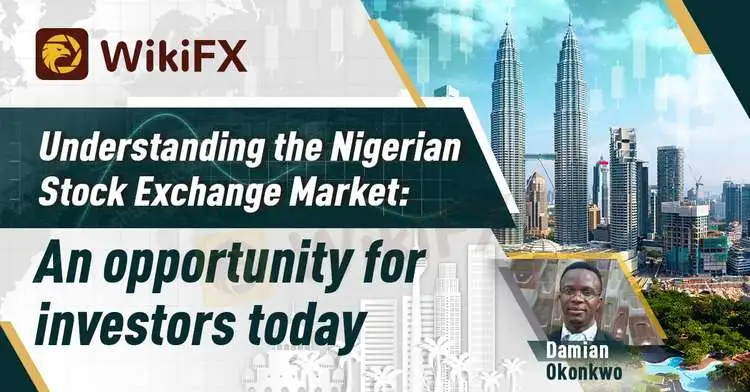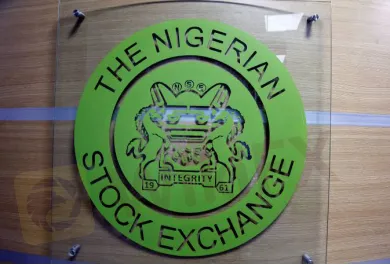简体中文
繁體中文
English
Pусский
日本語
ภาษาไทย
Tiếng Việt
Bahasa Indonesia
Español
हिन्दी
Filippiiniläinen
Français
Deutsch
Português
Türkçe
한국어
العربية
Understanding the Nigerian Stock Exchange Market: An opportunity for investors today
Abstract:The Nigerian Stock Exchange (NSE) was founded just a year after her independence in the year 1961. The first stock exchange market was established in Lagos. From here it spread to other parts of the country. As of today, over 4,900 companies have been listed on the NSE. On the Fixed Income market, the NSE has over 96 FGN bonds, 31 state bonds, 34 corporate bonds, 2 supranational bonds, and 53 memorandum listings.

By: Damian Okonkwo
Meaning of Stock Exchange Market
The stock exchange market is a centralized market where securities, such as company's stocks are bought as investments by individuals including the government in the hope of receiving higher returns as the company's network and stock value appreciates. When an individual purchases a company's stock, he becomes a legal shareholder in the company and is eligible to claim part of the company's residual assets and earnings based on the point he purchased. Stocks and shares are synonyms used interchangeably.
The stock exchange does not own shares any shares rather it acts as a market platform where stock buyers easily connect with stock sellers making buying and selling of stocks easy and reliable.
With the advancements in technology today, buyers and sellers no longer need to visit the open market to buy stocks but can simply do so from the comfort of their homes. This is made possible through stockbrokers.

How does the Nigerian Stock Exchange Market operate?
The Nigerian Stock Exchange Market runs an Automated Trading System (ATS) which was established by the Nigerian government on April 27, 1999. The ATS connects buyers with sellers and dealers through a computer network also known as Electronic Communication Network (ECN).
What are the trading hours for the Nigerian Stock Exchange Market?
The Nigerian Stock Exchange Market is every day from Monday to Friday at 9.30 a.m and closes at 2.30 p.m. Traders are free to carry out their transactions during these hours.
How can one Find the prices of different companies' stocks to purchase?
The Market prices of the stocks for all the companies listed on the NSE alongside an All-Share Index, NSE 30, and Sector Indices, are published daily in The Stock Exchange Daily Official List and also on the Nigerian Stock Exchange CAPNET (an intranet facility). Recommendations on the best stocks to buy can be found on the Wikifx.com website.
Who regulates the Nigerian Exchange Market?
The Nigerian Exchange Market is regulated by the Security and Exchange Commission (SEC) and supervised by the Federal Ministry of Finance.
Nevertheless, it is important to note that the stocks sold at the Nigerian Stock Exchange (NSE) are privately owned and regulated by the owners. The SEC only supervise the NSE to ensure that various companies fulfill their mandate to the shareholders. They protect the investors from fraud and bridge of trust.

Disclaimer:
The views in this article only represent the author's personal views, and do not constitute investment advice on this platform. This platform does not guarantee the accuracy, completeness and timeliness of the information in the article, and will not be liable for any loss caused by the use of or reliance on the information in the article.
Related broker
Read more

Forex Explained in 60 Seconds: How It Works & Who Profits
Before diving into the forex market, it’s crucial to understand its mechanics, risks, and profit potential. Without a clear grasp of how forex operates, you risk losing money instead of making it. Here’s a concise breakdown to help you navigate this dynamic financial market.

Check Yourself: Are You Always Rushing for Trades?!
With market fluctuations happening in real-time and profits hinging on split-second decisions, many traders develop an impulse to act quickly. But have you ever stopped to ask yourself: Am I rushing into trades? If you’re constantly clicking “Buy” or “Sell” in a flurry of excitement or anxiety, you may be falling into a dangerous trap that could cost you more than you realise.

Exposing Trading Academy Scams: How Aspiring Traders are at Risk
In the age of digital finance, the promise of financial freedom through trading has never been more alluring. Social media is flooded with advertisements for trading academies claiming to turn beginners into expert traders in weeks, offering ‘guaranteed’ profits and ‘exclusive’ strategies. However, behind the glossy marketing lies a sinister reality as many of these so-called academies are nothing more than elaborate scams designed to exploit unsuspecting traders.

Forex BackTesting: Pros and Cons | Best Free Backtesting Software to Explore
Imagine you're driving from New York City to Philadelphia and want to know if your route is optimal, then you take two steps: Firstly, you gather the traffic records in the past five years, including traffic patterns, historic weather conditions, and holiday congestion records. Second, you run simulations of your proposed road to see if it is most efficient and fuel-saving before an actual trip.
WikiFX Broker
Latest News
Forex Market Outlook: Key Currency Pairs and Trading Strategies for March 24–28, 2025
Singapore Police Crack Down on Scams: $1.9M Seized, 25 Arrested
Gold Prices Swing Near Record Highs
XTB Opens New Dubai Office
Africa Cybercrime Bust: Over 300 Arrested in Fraud Crackdown
The Growing Threat of Fake Emails and Phishing Scams
Hong Kong Banks and Authorities Collaborate to Freeze Fraudulent Accounts Faster
SocialFi and the Forex Market: A New Era for Decentralized Social Trading?
Is Billion Bucks Fx Scam?
BaFin Halts USDe Token Issuance, Citing Serious Compliance Failures
Currency Calculator







